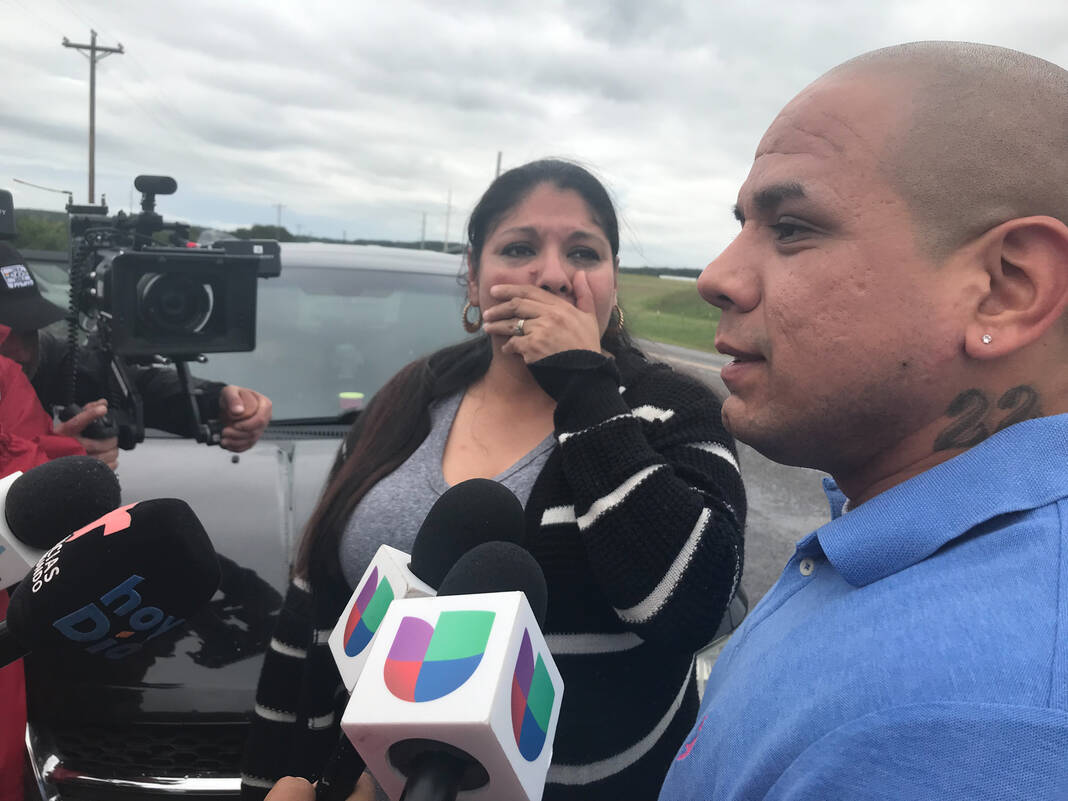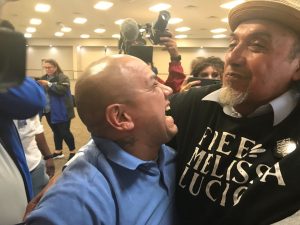
GATESVILLE — “Babe, my mom got a stay,” John Lucio said.
Instantly, his wife Michelle’s hand covered her mouth as she screamed in joy at a hotel lobby in Gatesville.
Melissa Lucio was granted a stay of execution by the Texas Court of Criminal Appeals on Monday, just two days before she was scheduled to be put to death on a capital murder conviction.
The ruling could lead to a new trial for the Harlingen mother as courts have yet to consider evidence cited in the defense motion that led to the stay of execution.
“If her conviction is overturned and she is granted a new trial, she will be returned to Brownsville,” said Vanessa Potkin, an attorney with the Innocence Project.
Lucio, who maintains her innocence, has been on death row since Aug. 12, 2008, 13 years, eight months and 13 days between the time she entered prison and Monday’s decision by the appeals court. The first Hispanic woman in Texas to be sentenced to death came to within 53 hours of lethal injection.
However, Potkin told media that she did not anticipate Cameron County District Attorney Luis V. Saenz would consider dropping the charges. The district attorney’s office has long stood by its evidence against the Harlingen mother, who was convicted of capital murder in the death of her 2 ½-year-old daughter Mariah Alvarez. Members of the Lucio family believe Mariah died by falling down a flight of stairs at their Harlingen apartment in 2007 — and not by the hands of the mother.
Since Lucio’s conviction, appellate defense attorneys had yet to make a win as major as Monday’s court ruling — just mere days away from her scheduled execution, which had been set for 6 p.m. Wednesday.
Her oldest son, John Lucio, learned of the court-ordered stay while he was at a Holiday Inn.
“I can’t even believe it. My heart is not even … I can’t even cope with it right now,” he said when asked for his reaction upon hearing the news. “It’s unbelievable — my mother is off death row; she’s not on death row anymore. The execution date no longer exists.”
John was getting quarters for his mother at the hotel and doing media interviews while defense attorneys met with his mother. That’s when he received a call from his mother’s lead attorney, Tivon Schardl, who informed him of the stay.
“(I was) in the middle of the Holiday Inn in the lobby, and (everybody) just started yelling, everybody coming out of the rooms (asking) ‘what the heck is going on?’ We’re celebrating — that’s what’s going on,” he said, adding he’s “bringing her quarters so she can get her snack on.”
Lucio spoke briefly during a news conference Monday afternoon via speaker phone, which John Lucio held up to microphones, saying only, “I just want to say thank you to everybody that supported me and (have) given me love.”
For most of the day, a canopy of clouds stretched over Coryell County. Early that morning, drizzle and a chill wind met guards turning away media at the entrance to the Mountainview Unit, and inside the women’s prison, Lucio had just finished with her day’s first set of visitors, separated by a pane of plexiglass from documentary filmmaker Sabrina Van Tassel and her year-long pen pal Sandra Jonas, an attorney from Arizona.

Upon exiting the women’s prison, they passed Lucio’s sons John and Bobby, who were on their way inside.
“We hugged,” Van Tassel said.
Van Tassel’s 2020 film, “The State of Texas vs. Melissa,” has been a rallying force behind Lucio’s call for clemency, helping to give birth to the Free Melissa Lucio campaign — and inspiring a friendship born over an exchange of letters. Prior to writing to Lucio, Jonas had never before reached out to a stranger, but Lucio surprised her by writing back.
“I was inspired by her story and her strength,” she said. “And I just wanted to reach out to her.”
Melissa Lucio had invited her and the filmmaker in to visit Monday as friends. A week earlier, Lucio had denied all requests for visits from media outside of one request from EFE, a news agency from Spain.
“In our visit, we talked about what’s your reaction if you’re granted clemency and what’s your reaction if this goes through on Wednesday,” Jonas told The Brownsville Herald moments after leaving the prison. “And she said, ‘I’m getting freedom either way. I’m either getting freedom to go home to my family, freedom to go to life without parole and be there for my family, or freedom to go home to heaven.’
On her left arm, Jonas wore a pink sticker of a heart and a pug, which she wasn’t allowed to send to Lucio. The prison did not allow stickers of any kind, she explained.
“I told her when she gets out, I’m buying her a pug,” she said.
All morning, Lucio’s family and friends waited and hoped, spending what moments they could with Lucio inside the prison’s visitation area, taking turns to fill the eight available hours of visitation.
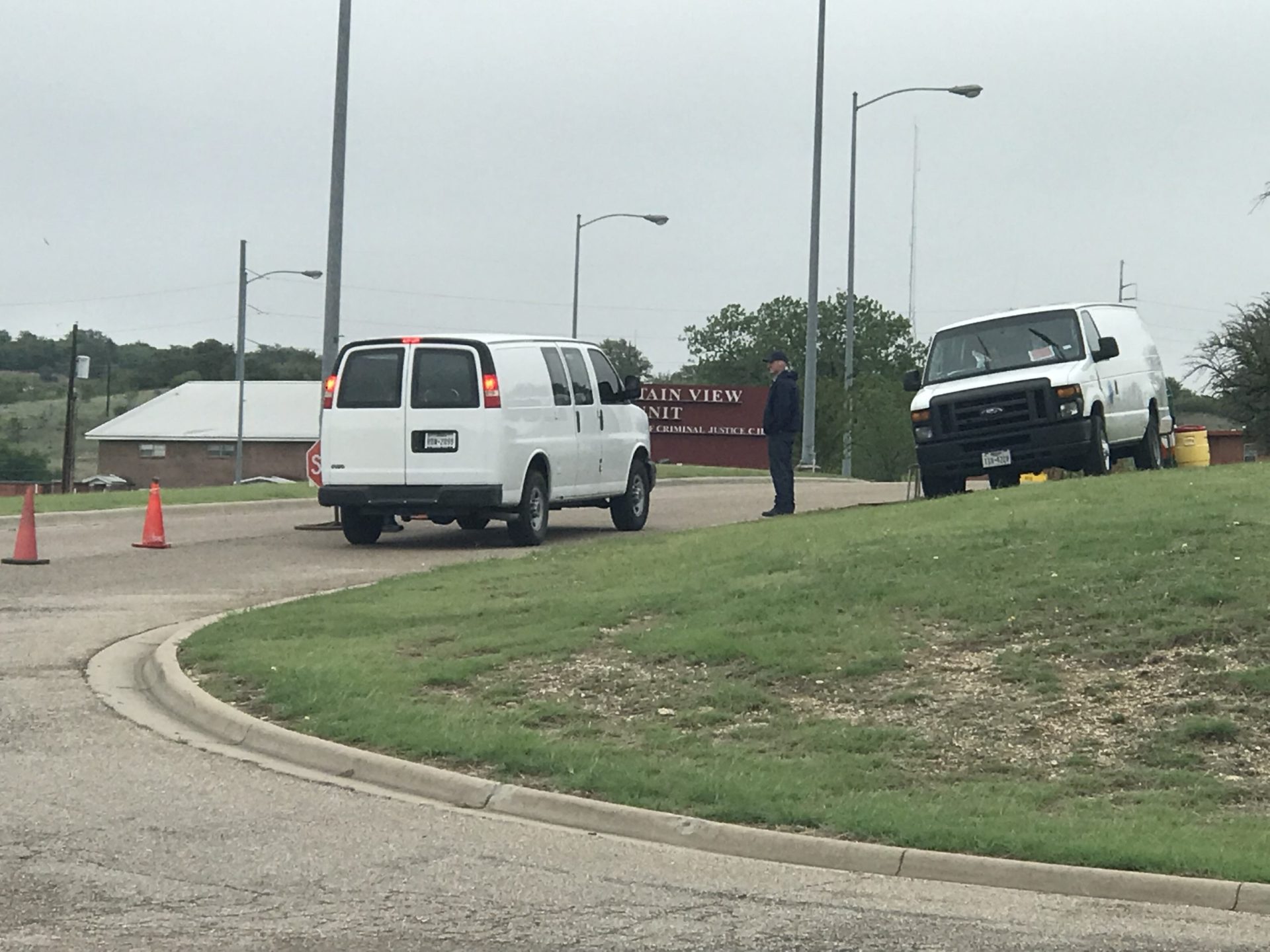
John Lucio had been inside for a couple hours, until he briefly left after noon to let attorneys inside.
“Nobody can really understand what it means to be in his (John’s) shoes right now,” Van Tassell said. “To know that your mother is 48 hours away from being executed for something that was an accident is just impossible for him.”
Prior to the news of the stay, John Lucio provided interviews to a crush of media waiting outside the prison and at his hotel. With each question, he spoke with hope despite his many other emotions and insufficient sleep, estimating that he gets two to three hours of sleep at night. “Four hours at the most,” he added.
Friday, for the first time, John Lucio revealed his fear to his mother. Prior to then, he had been the one telling family to hold back for her sake. He would tell them, “we don’t have to let her see us in pain, to see our tears.”
This weekend, that changed.
“I had to be honest with my mother. Yes, I’m scared. I’ve been scared,” he said. “I let it out. She cried with me. She said ‘be at peace. Be calm.’”
John Lucio said it felt like he was the one set to be executed while his mother was not scared.
After news broke of the stay, he rushed back to the prison to see his mother and to share his joy with her.
The ups and downs have been draining, he said, comparing himself to a phone battery that draws energy from his mother.
“When you charge up your phone to 100%, and you have one of those phones that die fast,” he said. “We’re that phone that dies fast. When we are with her, we are recharged with peace and calm — because she is contagious. But once we leave from there, it’s a whole other story. It’s pain again.”
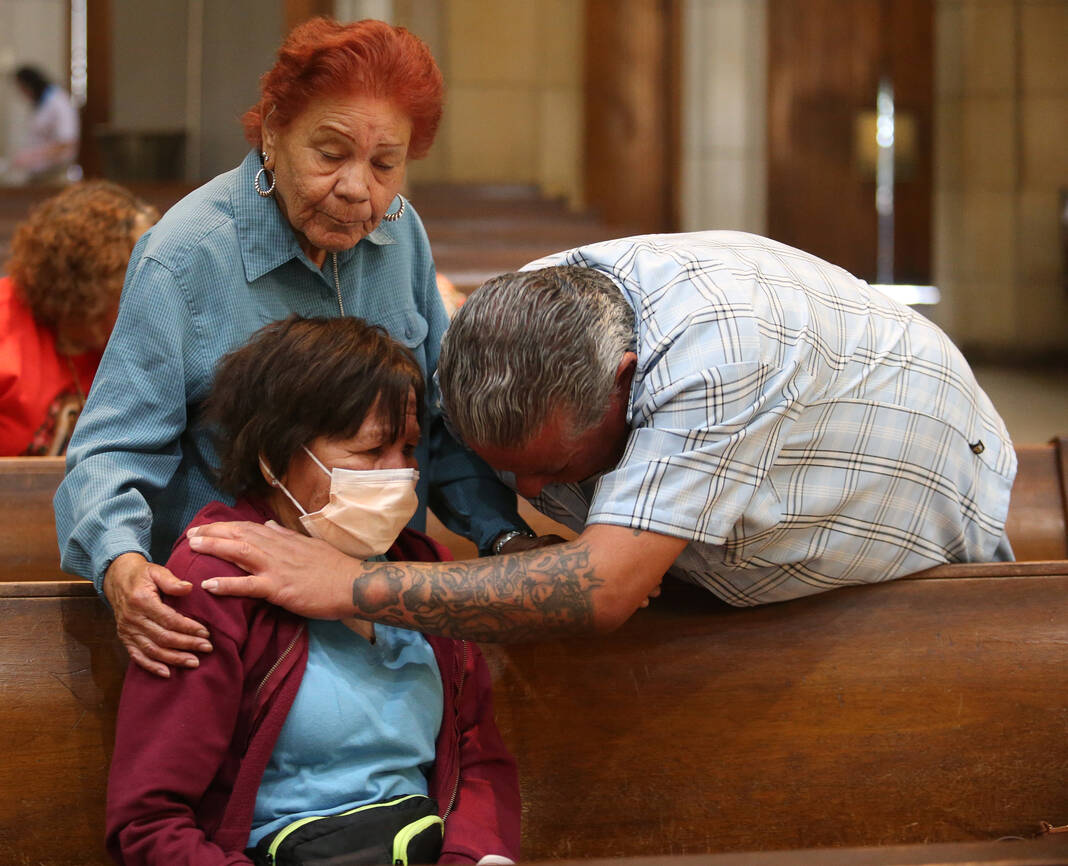
Monday morning, Lucio’s defense attorneys had filed a supplement to her motion to withdraw the order setting her execution date for 6 p.m. Wednesday. That was the third supplement to a motion that had been pending before the court since Feb. 8.
Early Monday morning, it appeared the defense was working against time.
The filing stated: “The Subsequent Application presents overwhelming evidence that the judgment this Court set for execution on April 27, 2022, represents a miscarriage of justice.”
The supplement, the motion’s third, cites “reports of numerous medical experts who identify objective scientific evidence” that dispute the findings of the medical examiner who testified at Lucio’s trial.
The filing disputes what Saenz told a committee of state House of Representative on April 12 that he would be restrained from taking action to rescind the execution warrant that had been in place since January. He told legislators that a defense motion to recuse the judge that issued the warrant would block his efforts to take any action to lift the order.
“That was a misstatement of the law,” the motion reads. “When a motion to disqualify or recuse ‘is filled after evidence has been offered at trial, the respondent judge may proceed, subject to a stay by the regional presiding judge.”
The motion states the presiding judge has taken no action to recuse the judge who issued the execution warrant.
Saenz had promised to request the warrant be rescinded if motions had still been pending and courts needed more time before Wednesday.
In a statement Monday afternoon, Saenz said he had “fully expected” that the appellate court would grant a stay.
“On April 11, 2022, I informed the Interim Committee on Criminal Justice Reform that the case of Melissa Lucio had not been ‘finally decided.’ At that time there were still numerous defense motions, filed after the execution date had been set, that were still pending disposition,” Saenz said in the statement. “I fully expected the Court of Criminal Appeals to stay Lucio’s execution to allow time for those motions to be heard. Today, the Court of Criminal Appeals stayed the execution of Melissa Lucio to allow two motions to be heard.”
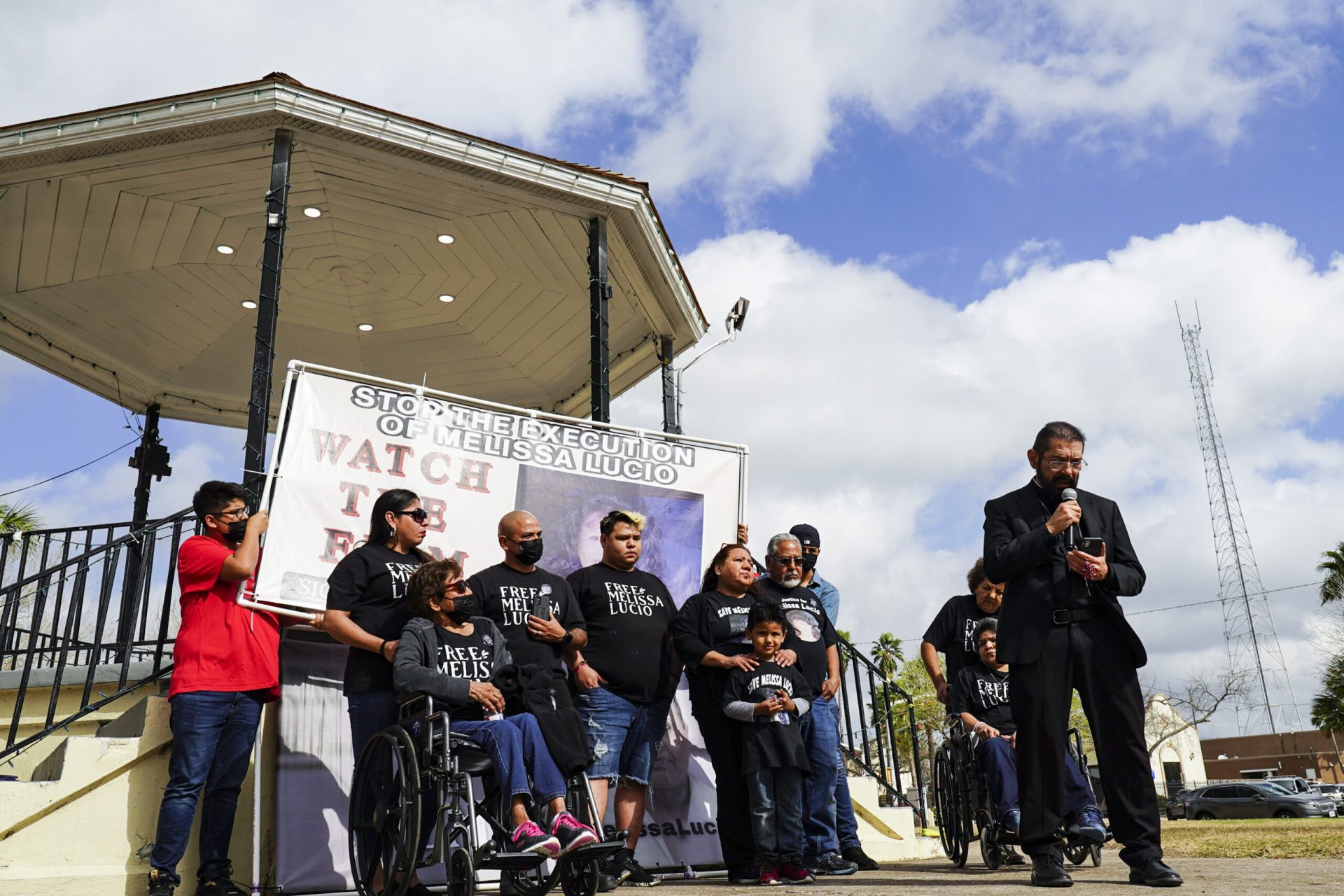
The Cameron County district attorney went on to state that he looks forward to prosecuting the case in court, “where witnesses testify under oath, where witnesses may be cross-examined, where evidence is governed by the rules of evidence and criminal procedure, and where the court rules pursuant to the rule of law. That is our criminal jurisprudence system, and it is working.”
Neither Saenz nor the Court of Criminal Appeals had been Lucio’s only hope. Lucio, her defense attorney, and her advocates spent Monday morning in anticipation that the Texas Board of Paroles and Pardons would send a recommendation to Gov. Greg Abbott that would lead to a stay of execution — or perhaps even freedom for the first Hispanic woman to sit on the state’s death row — or that Saenz would file a request to rescind the execution warrant.
But shortly before 1 p.m., the court’s stay of the execution came before any action from the parole board, which no longer had to take any action in the case as the execution date was formally lifted. By rule, the parole board makes recommendations to the governor two days before a scheduled execution.
Regardless, more than 8,000 letters had been sent to the board in favor of Lucio, including 20 state senators who had publicly expressed favor for giving Lucio more time to prove her case.
Among them, Sen. John Whitmire, chair of the Senate Justice Committee, wrote a letter to the pardons and parole board Monday, stating: “As you and the full board begin deliberations of the proper outcome for Melissa Lucio, I want to express my serious concerns about the integrity of the finding in her trial. I believe you and the Board should vote in favor of a clemency or a reprieve in her case.”
Whitmire stated he had “come to the conclusion that the execution should not be carried out at this time.”
Saenz, in January, described the prosecution’s physical evidence as proof of abuse and murder.
“The condition of Mariah’s body indicated that she had been severely beaten,” Saenz said in early 2022. “There were bruises in various states of healing covering her body, there were bite marks on her back, one of her arms had been broken, probably about two to seven weeks prior to her death, and she was missing portions of her hair where it had been pulled out by the roots.”
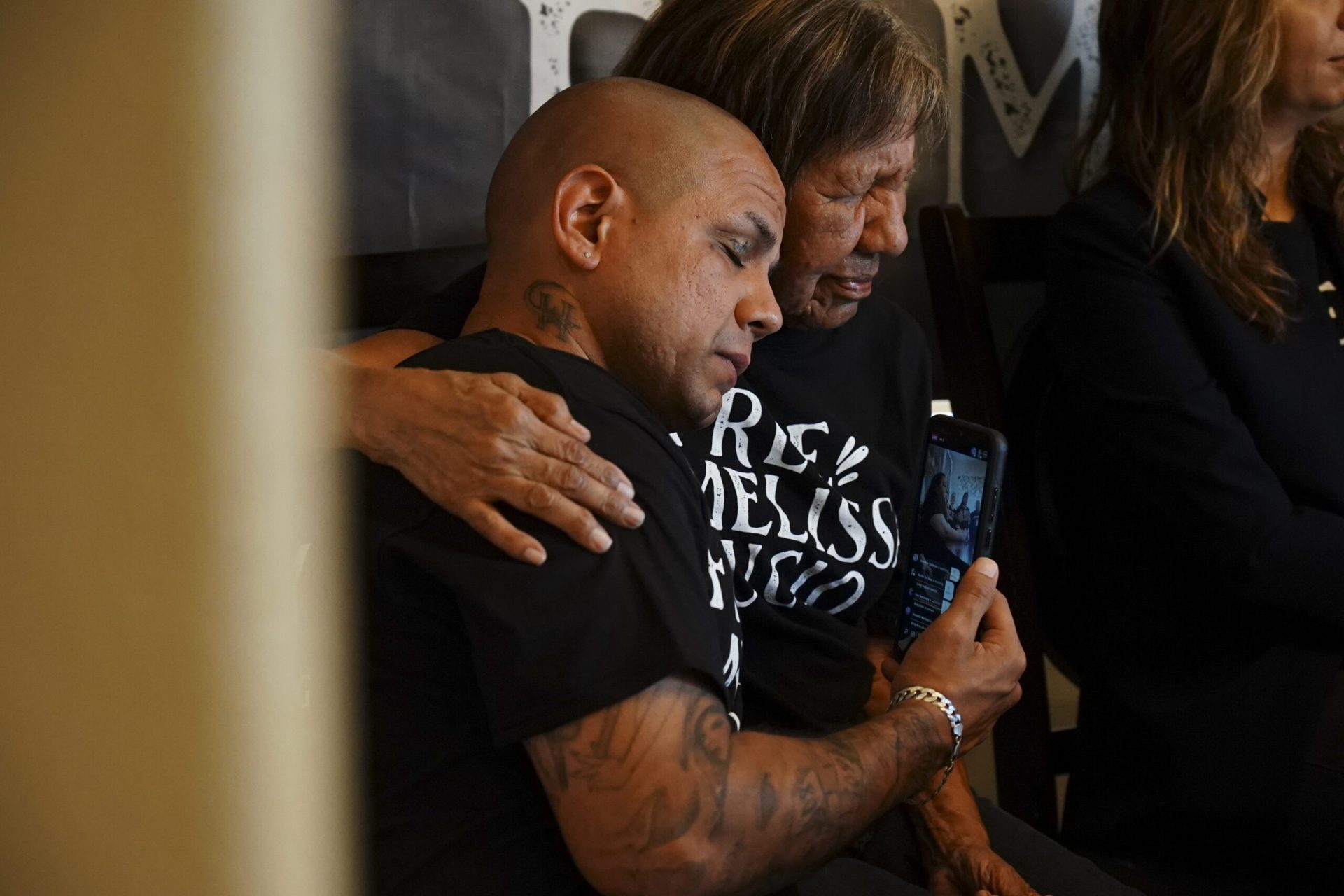
Monday’s ruling means defense attorneys can counter the prosecution’s interpretation of the evidence with new expert witnesses about the autopsy and her the interrogation that was presented as a confession.
Lucio’s defenders reject that an interrogation by police and Texas Rangers in 2007 should have been taken as a confession, saying she was bullied into incriminating herself after hours of maintaining her innocence with investigators.
Van Tassel says Lucio, a victim of childhood sexual assault, sees herself as a “very different person today.”
“She said, ‘I’m not the same person those investigators intimidated that day. I wouldn’t let myself be treated that way anymore’,” Van Tassel said.
Meanwhile, there is no legal means to have Lucio released from prison prior to a hearing ordered by the appeals court, Potkin said, adding that a court then could consider release on bail if it orders a new trial.
“That occurs with a recommendation of a new trial in the case,” Potkin said. “We still have work to do to move Melissa’s case forward, and this ruling today by the Court of Criminal Appeals really opened the door to us getting back into court and for us presenting the new evidence of Melissa’s innocence, for the first time to a fact-finder. No court has ever heard any of the experts who have come forward, so this is an incredible opportunity to really move Melissa’s case forward and really fight for her full exoneration.”

